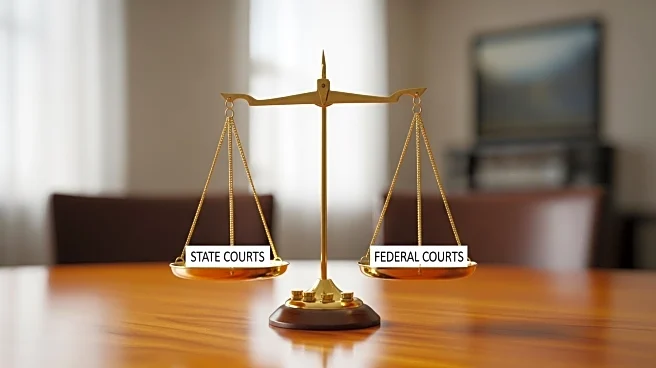What's Happening?
The U.S. Supreme Court is being urged to address a significant legal question regarding climate change litigation that has been advancing through state and federal courts. The central issue is whether
the Clean Air Act preempts state common law claims of public nuisance related to climate change. This term, the court has the opportunity to review the case of Suncor Energy USA Inc. v. County Commissioners of Boulder County, which involves a Colorado Supreme Court decision allowing plaintiffs to proceed with state tort and consumer deception claims. The case highlights a long-standing legal debate, as the Supreme Court has only addressed similar claims once before, in the 2011 case of American Electric Power Co. Inc. v. Connecticut. The current petition for certiorari seeks clarity on whether the Clean Air Act preempts state law claims, a question left unresolved in the previous ruling.
Why It's Important?
The outcome of this Supreme Court review could have significant implications for climate change litigation across the United States. A decision to grant certiorari in the Suncor case would provide much-needed clarity on the interplay between federal preemption and state common law claims. This clarity is crucial for both courts and litigants, as inconsistent rulings have emerged from various state courts. The national significance of the case is underscored by the involvement of the Solicitor General, who filed an amicus brief urging the Supreme Court to grant review, citing national security implications. Resolving this legal uncertainty could impact how states pursue climate change lawsuits and influence the broader national approach to climate change policy.
What's Next?
The Supreme Court's decision on whether to grant certiorari in the Suncor case is anticipated soon, with Boulder County's response to the petition due by November 10. If the court decides to hear the case, it could lead to a landmark ruling that clarifies the scope of federal preemption under the Clean Air Act. This decision could affect ongoing and future climate change litigation, potentially setting a precedent for how similar cases are handled nationwide. Stakeholders, including energy companies, environmental groups, and state governments, are closely watching the developments, as the ruling could reshape the legal landscape of climate change accountability.
Beyond the Headlines
The broader implications of the Supreme Court's involvement in climate change litigation extend beyond legal clarity. A decision in favor of federal preemption could limit states' ability to hold energy companies accountable for climate-related damages, potentially affecting public policy and environmental regulation. Conversely, a ruling that supports state claims could empower local governments to pursue more aggressive climate action. The case also highlights the intersection of environmental law and national security, as former military leaders have emphasized the importance of resolving legal uncertainties to address climate change threats effectively.









